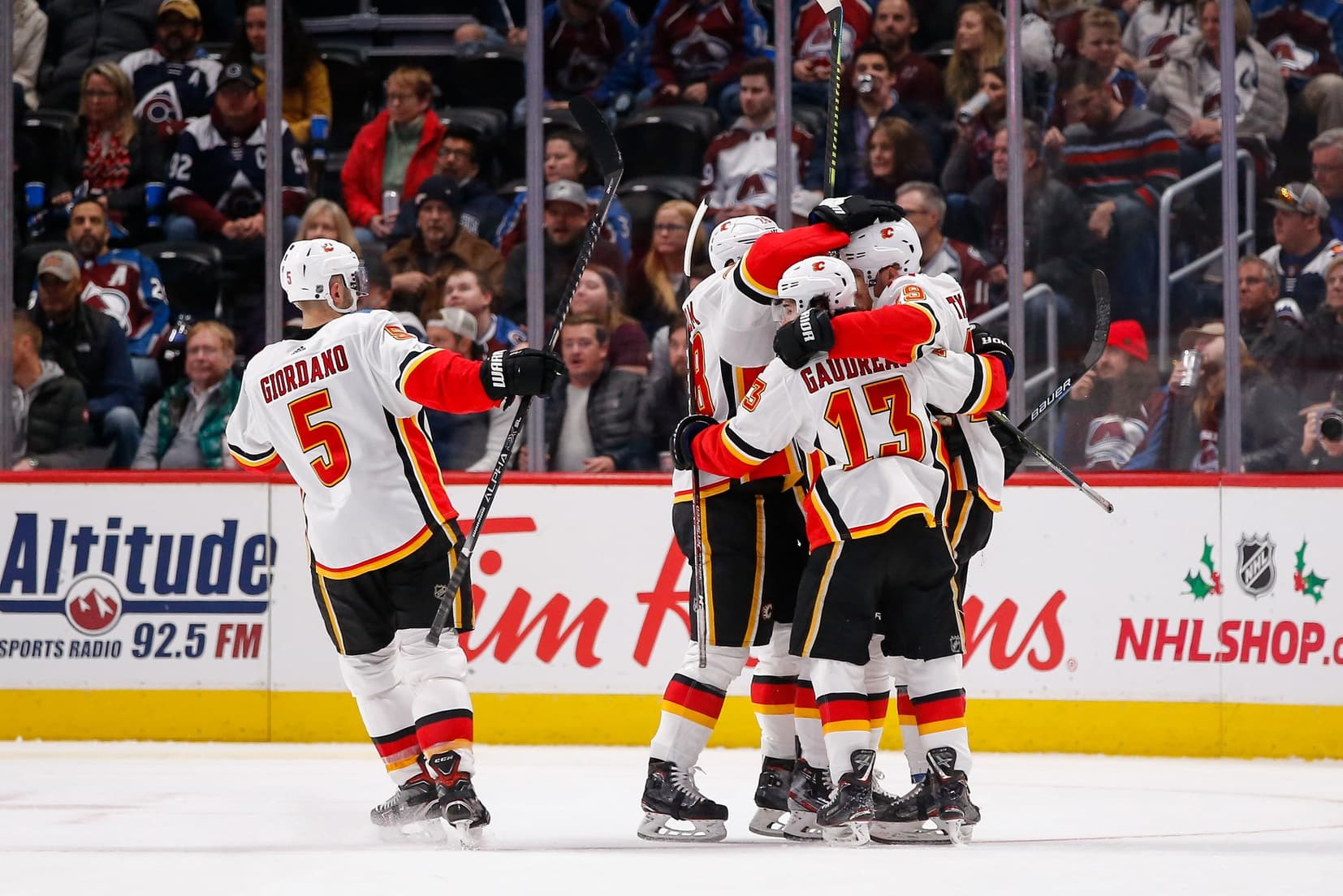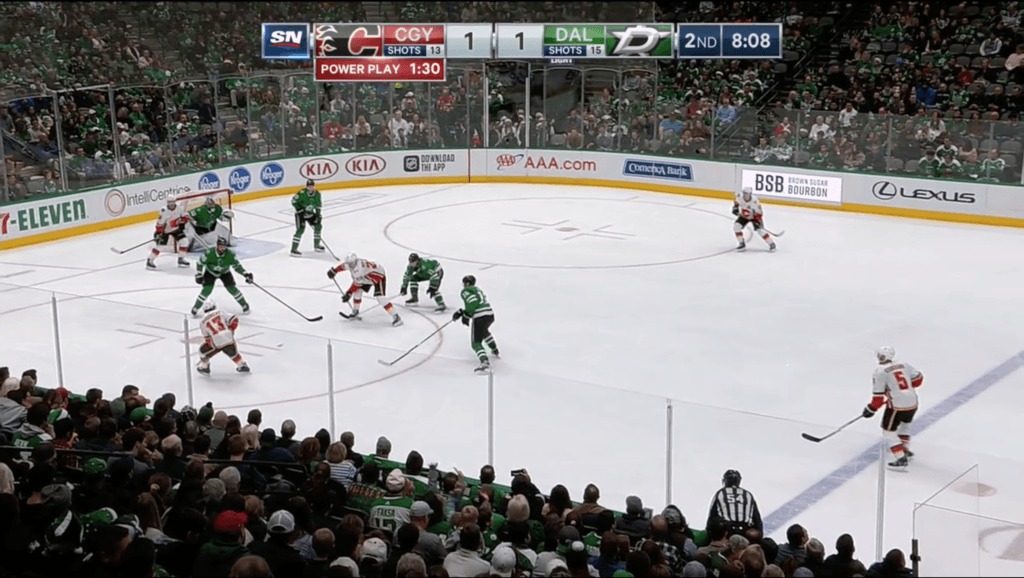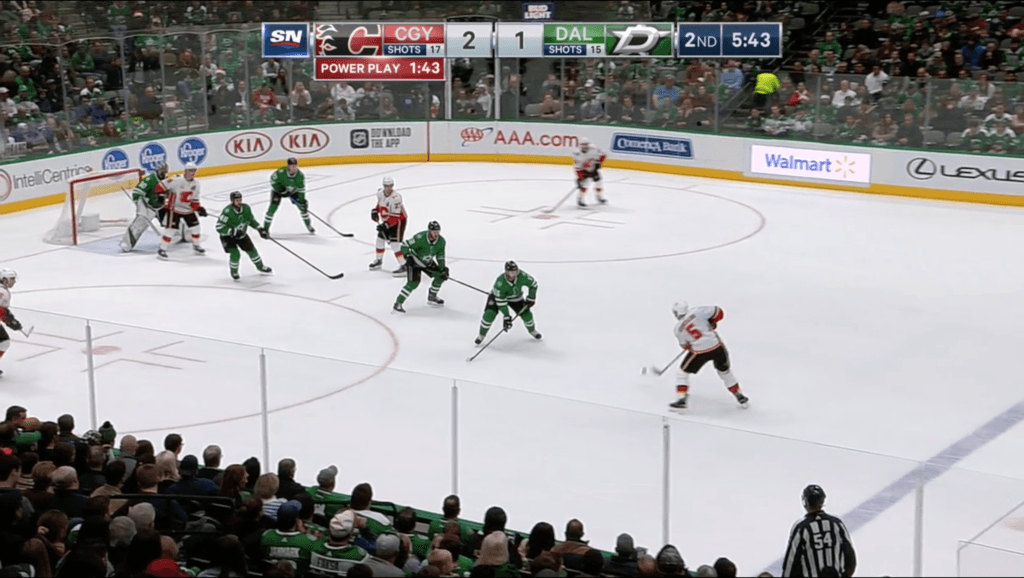Nation Sites
The Nation Network
FlamesNation has no direct affiliation to the Calgary Flames, Calgary Sports and Entertainment, NHL, or NHLPA
Flames put the ‘pow’ in power play against Dallas

Photo credit: Isaiah J. Downing/USA Today Sports
Over the past few weeks, whenever the Calgary Flames have struggled it has been because their special teams units failed to put them over the top. On Saturday evening in Dallas, their special teams units were the absolute difference in a 5-1 victory.
“The special teams were huge for us tonight,” said interim head coach Geoff Ward. “The power play looked like it did for long stretches last year. I think the key for us tonight is that the puck movement was quick and it was on the tape, so we were able to one-touch a lot of pucks around, not allowing the box to re-set.”
For a sense of what Ward means by that, here’s a quick snapshot of the power play alignment just prior to the first PP goal.

It’s a pretty simple 1-3-1 setup, but the way the Flames utilized it allowed for rapid-fire passing. On this goal, Tkachuk (top of the image) is prepping to receive the pass. He’s able to walk in a bit and beat Bishop with a wrist shot because his positioning (and the alignment of the other players) leaves it unclear if he’s going to shoot or pass, so the Stars PK can’t fully commit to either until it’s too late.
Here’s the alignment prior to the second goal.

As before, Giordano has all his options open, and the umbrella position – the passing options on both sides are open – allows some quick passes to stretch the PK positioning out. On this goal, Giordano’s pass leads to a couple rapid-fire passes and a tap-in for Monahan at the front of the net.
The third power play goal was a nice individual effort by Mikael Backlund off the rush.
The Flames had three goals on six power play shots, going three for five on face-offs (which allowed them to hold onto the puck and pressure Dallas immediately). The Flames gave up zero power play goals on four Dallas PP shots, going five for seven on face-offs over their three penalty kills.
The even strength game was a toss up. Special teams swung the game entirely.
How did the new faces fare?
There was a fair bit of hand-wringing on social media about Ward’s decision to sit Dillon Dube, Oliver Kylington and Michael Frolik in favour of Mark Jankowski, Michael Stone and Zac Rinaldo.
So how did the swap turn out? In short: the new guys did just fine, but not overwhelmingly so.
- Zac Rinaldo played 10:15, drew a penalty, took a penalty, and was minus-1 with one shot.
- Mark Jankowski played 12:51, went 33% at the face-off circle, and was minus-1 with two shots.
- Michael Stone played 14:18, and was even with three shots.
David Rittich had an assist against Dallas. His assist tied him with Jankowski on the Flames scoring leaderboard – and since Rittich has played fewer games than Jankowski, he wins that tiebreaker.
Breaking News
- The Flames acquired Jarome Iginla 30 years ago this week
- Flames trade rumours: asking price for Rasmus Andersson last season was a first and a ‘good prospect’
- Flames Game Day 36: A visit from the Golden Knights (8pm MT, SN/CBC/City)
- The Flames have made some progress in 2025-26, despite some tough results
- Recap: No Christmas miracle for the Wranglers in overtime against Matthew Phillips
